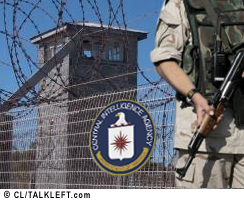Home / Terror Detainees


From SuperMax to GitMax. The U.S. is finalizing plans for the newest maximum security prison at Guantanamo. The Associated Press reports we are spending $37.8 million on the facility to house a maximum of 220 prisoners. That doesn't even include the upkeep or cost of confinement.
Underscoring the military's toughening stance, a jailhouse in the final stages of construction on a cactus-studded plateau overlooking the Caribbean is being "hardened" into a maximum-security facility. Camp 6 was to have opened in August as a medium-security lockup. The modifications have pushed back the completion date of the $37.8 million jailhouse, which has a capacity for 220 inmates, to Sept. 30. It will take its first detainees in mid-October, Army Capt. Dan Byer said.
How long will they be there? Forever.
"I think what we have here is an orange. What we're doing is squeezing out the juice and what we're left with at the end of the day is pulp that will just stay here," said Navy Capt. Phil Waddingham, lead officer here for the Office for the Administrative Review of the Detention of Enemy Combatants.
From a flawed policy to a disasterous policy. As op-ed contributor and former military man Paul Reikoff writes in the New York Times today, Do Unto Your Enemy...
(25 comments, 581 words in story) There's More :: Permalink :: Comments
by TChris
The compromise between three Republican senators and the Bush administration over language in legislation governing the interrogation and trial of detainees turned back the worst of the administration's intentions, but that is no reason for the bill to win the support of any Democrat -- or, for that matter, any Republican who cares about justice. When the executive branch acts both as prosecutor and as judge and jury, the only safeguard against a sham proceeding is judicial review. If a court cannot perform the limited function that habeas corpus provides -- assuring that the proceeding comported with the Constitution and laws of the United States -- the executive branch will be given the unreviewable power to imprison the innocent indefinitely.
There are other flaws in the compromise, but its prohibition of judicial review is enough to earn a filibuster. Preserving the role of the judicial branch and the right to due process and habeas corpus should be the default position of Democrats, but there's no reason to expect even a majority of elected Democrats in the Senate or House to fight for the Constitution. Too many Democrats during the Bush years have displayed their unwillingness to stand up for first principles, at risk of being labeled "soft on terror." How sad it is that politicians don't fear being labeled "soft on human rights" or "soft on the Constitution."
(9 comments, 393 words in story) There's More :: Permalink :: Comments


On NPR yesterday, former President Bill Clinton opposed torture of terror detainees.
In an interview with National Public Radio aired on Thursday, Clinton said any decision to use harsh treatment in interrogating suspects should be subject to court review. "You don't need blanket advance approval for blanket torture," Clinton said.
Clinton warned against circumventing international standards on prisoner treatment, citing U.S. abuses at Abu Ghraib prison in Iraq, criticism of treatment at the Guantanamo Bay prison for suspected terrorists and a secret CIA prison system outside the United States.
Clinton also critized Bush's program:
(64 comments, 258 words in story) There's More :: Permalink :: Comments
by TChris
News of a possible compromise between the White House and Republican senators over legislation authorizing military trials and interrogations of detainees is vague. It appears that the administration has given ground, but "few details were available, and it was not clear whether a compromise was imminent or whether the White House had shifted its stance significantly."
The new White House position, sent to Capitol Hill on Monday night, set off intensified negotiations between administration officials and a small group of Republican senators. The senators have blocked President Bush's original proposal for legislation to clarify which interrogation techniques are permissible and to establish trial procedures for terrorism suspects now in United States military custody.
If a compromise bill that satisfies Republicans finally emerges, Democrats will need to scrutinize it to assure that it leaves the Geneva Conventions intact, that it gives detainees a meaningful hearing with the procedural protections that due process requires (no secret evidence or unconfronted hearsay), and that it doesn't immunize government employees or officials from responsibility for past or future violations of human rights. Will enough Democrats be up to the task to assure that the United States stands firmly and finally in support of fair, just, and humane treatment of those it detains?
(5 comments) Permalink :: Comments

by TChris
The favorable coverage that the president expects from AP may disappear now that AP has skin in the game. The administration hasn't endeared itself to AP by detaining one of its photographers for the last five months.
"We want the rule of law to prevail. He either needs to be charged or released. Indefinite detention is not acceptable," said Tom Curley, AP's president and chief executive officer. "We've come to the conclusion that this is unacceptable under Iraqi law, or Geneva Conventions, or any military procedure."
Well, yes, but that's true of all the 14,000 detainees, not just the one AP happens to employ. Still, the detention of journalists suppresses a free press and is therefore particularly offensive. What better way to stem the flow of information than to arrest the messenger?
(19 comments, 371 words in story) There's More :: Permalink :: Comments

The Associated Press reports today the U.S. has held 14,000 detainees overseas in secret prisons "beyond the reach of established law."
The bitterest words come from inside the system, the size of several major U.S. penitentiaries.
"It was hard to believe I'd get out," Baghdad shopkeeper Amjad Qassim al-Aliyawi told The Associated Press after his release -- without charge -- last month. "I lived with the Americans for one year and eight months as if I was living in hell."
Captured on battlefields, pulled from beds at midnight, grabbed off streets as suspected insurgents, tens of thousands now have passed through U.S. detention, the vast majority in Iraq. Many say they were caught up in U.S. military sweeps, often interrogated around the clock, then released months or years later without apology, compensation or any word on why they were taken. Seventy to 90 percent of the Iraq detentions in 2003 were "mistakes," U.S. officers once told the international Red Cross.
(25 comments, 400 words in story) There's More :: Permalink :: Comments


Update: Great editorial from the New York Times on how fear-mongering has reached Congress -- scared to death of the November elections, they are in a stampede to throw due process out the window. Analysis here.
********
Via Raw Story, Bloomberg News reports the Senate Armed Services Committee rejected President Bush 's plan for trying terror suspects in military tribunals today and passed its own bill instead, with greater protections for the rights of the terror suspects.
(19 comments, 193 words in story) There's More :: Permalink :: Comments
by TChris
Colin Powell is the latest Republican to stand up to President Bush's plan to reinterpret the Geneva Conventions to permit the abusive interrogation of detainees.
"The world is beginning to doubt the moral basis of our fight against terrorism," Powell said. "To redefine [a portion of the Geneva Convention] would add to those doubts."
Powell also agrees with the argument that Americans captured in foreign countries are at greater risk of abuse if the U.S. unilaterally rewrites the Geneva Conventions.
Update: Here's the letter.
(13 comments) Permalink :: Comments
by TChris
The White House wants to "reinterpret" the Geneva Conventions to permit a more aggressive approach to the interrogation of prisoners. John Negroponte told recalcitrant Republican senators that the Conventions "impose intolerable limits on any interrogation methods American intelligence officers might use against future terror suspects held by the Central Intelligence Agency in secret overseas prisons."
Those limits protect American soldiers from abuse and torture. It is intolerable that an administration official would advocate the weakening of an international agreement that safeguards captured Americans.
According to the NY Times, President Bush is "trying to put Democrats in a box by forcing them to take a stand and vote on Mr. Bush's authority to run two of his most controversial antiterror programs." Do Democrats need to be "forced" to take a stand against torture? Shouldn't we expect Democrats to stand in favor of long-standing agreements that assure humane treatment of American prisoners?
(19 comments, 416 words in story) There's More :: Permalink :: Comments
by TChris
TalkLeft recently introduced you to Majid Khan, one of the detainees held in a (formerly) secret prison before being transferred to Guantanamo. Now meet Muhibullo Abdulkarim Umarov, formerly held as an enemy combatant at Guantanamo.
It was early in the morning of May 19 when Pakistani secret service agents came. The agents woke them up, took the T-shirts down, and used them to tie the men's hands and cover their eyes. When his blindfold was removed, Umarov was in a jail cell, his friends at his side. "I was not afraid," he says. "I knew I'd done nothing wrong."
Umarov was questioned about a suicide bombing in Pakistan that he knew nothing about. After ten days, he was handed over to two Americans wearing civilian garb.
(3 comments, 950 words in story) There's More :: Permalink :: Comments
by TChris
The NY Times explores the genesis of the Bush administration's secret prisons:
According to accounts by three former intelligence officials, the C.I.A. understood that the legal foundation for its role had been spelled out in a sweeping classified directive signed by Mr. Bush on Sept. 17, 2001. The directive, known as a memorandum of notification, authorized the C.I.A. for the first time to capture, detain and interrogate terrorism suspects, providing the foundation for what became its secret prison system.
And the genesis of torture:
That 2001 directive did not spell out specific guidelines for interrogations, however, and senior C.I.A. officials began in late 2001 and early 2002 to draw up a list of aggressive interrogation procedures that might be used against terrorism suspects. They consulted agency psychiatrists and foreign governments to identify effective techniques beyond standard interview practices.
Policy became practice in a Thailand prison, where the CIA concluded that the FBI's standard interrogation techniques weren't inducing Abu Zubaydah to tell all he knew about al Qaeda:
(8 comments, 529 words in story) There's More :: Permalink :: Comments
by TChris
Three presidential claims, three probable lies. It was just another day at the Bush White House.
In defending the Central Intelligence Agency's secret network of prisons on Wednesday, President Bush said the detention system had used lawful interrogation techniques, was fully described to select members of Congress and led directly to the capture of a string of terrorists over the past four years. A review of public documents and interviews with American officials raises questions about Mr. Bush's claims on all three fronts.
TalkLeft wrote about torture in the secret prisons here and here. As to briefing Congress:
(320 words in story) There's More :: Permalink :: Comments
| << Previous 12 | Next 12 >> |







